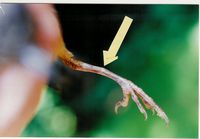|
WILD BIRD RESCUE

The first and most important questions that need to be asked, is ‘when does a baby bird need your help?’ many young birds leave their nest before they are able to fly, being naturally cared for by their parents outside the nest while they finish growing up. Good examples of these are the Burchell’s Coucal and most of the dove family. Although more advanced and better developed than these, most other birds still do not fly well, and are certainly not independent when they leave the nest. It goes without saying that any naked and helpless baby bird found lying on the ground below a nest has fallen or been thrown out, and needs help.
Should you find a baby bird, which is already well feathered and able to move about quickly, whose parents are nearby and seem to be caring for it, ask yourself the following questions before rescuing it:
· Does it seem to be weak from hunger or cold?
· What is the predator situation? Even a healthy, well-fed baby stands no chance in a garden populated by two cats and a dog. It needs to be saved!
· Is it obviously compromised, for example, by falling into a swimming pool or soaked to the skin by a thunderstorm?
If the answer to any of these questions is ‘yes’, rescue the bird and get help quickly. Wings in Need helps wild birds, and will be pleased to assist you. No bird is ever turned away.
If you find a baby bird which is obviously still helpless, try to locate the nest from which it has fallen. If it’s possible to reach the nest without causing a major disturbance to the parents, and you have thoroughly checked the baby for injuries (compare the two wings and legs for any difference, which could suggest a break or sprain):
· Warm the baby up (see previous issues of Animal Talk for how to do this); it is likely to be chilled. Chilled babies will not beg, so their parents will not feed them, and will simply throw them out of the nest again.
· Dribble a little fluid (ideally emergency oral electrolytes mixed with a little raw egg yolk) into the beak, taking care not to choke the baby.
· Now, surreptitiously, return the warm, re-hydrated baby to the nest. Cup your hands over the nest or the entrance for a few minutes until the baby has settled down.
· Settle a good distance away from the nest (at least 15m meters away, further is better), and watch to see if the parents return to feed and brood. If they do not return within 30 minutes ( In the case of Doves, longer) the baby will have to be hand- raised.
Part II of next months issue will discuss how to feed and care for rescued babies.
Does the bird really need help?
Most of the birds picked up brought to Wings in Need during the past twenty years needed some form of help. – If in any doubt, rather take the bird to an expert for an opinion.
To help or not to help......... Would you (or even a vet) have noticed the greenstick fracture on this baby bird's leg? By simply putting this baby bird back in its nest (and how sure would you really be that this is its nest?) would mean a lifetime of being a cripple. This leg needs splinting! And the toes are limp! Don't forget the Vitamin B complex please!

Click to Enlarge
It is an OLD WIVES TALE that birds will reject their babies after being touched by humans: with the exception of a few species, birds have a poor sense of smell. They may however reject the babies if your endeavours are not done quietly and discreetly.
By Gordon M Duncan & Wings in Need
Animal Talk September 1999
< Back
|













